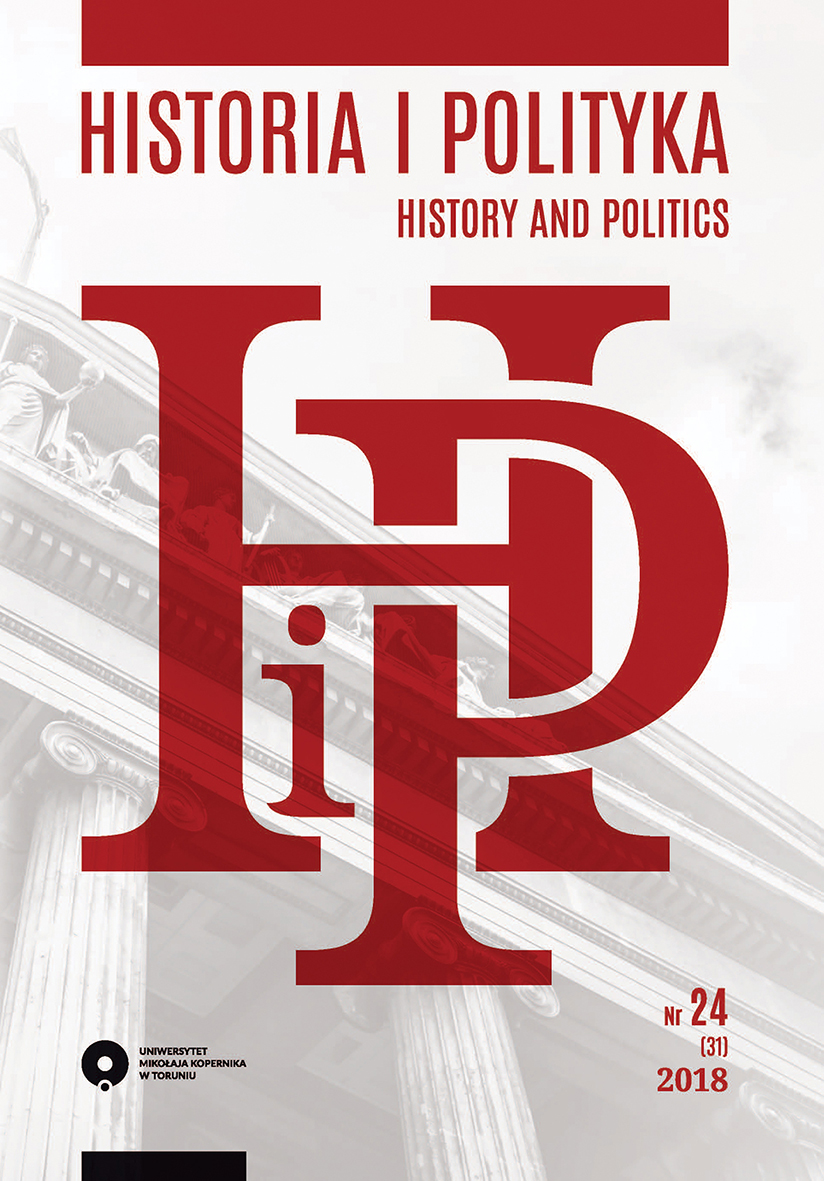German Question in 1945–1949: Research of the Problem in Anglo-American Historiography
DOI:
https://doi.org/10.12775/HiP.2018.016Słowa kluczowe
the German question, the zonal division, the reparation problem, the first Berlin crisis, Anglo-American historiography, “containment” school, conservative approach, rationalistic direction, liberal approachAbstrakt
The article is devoted to the research of the main streams in Anglo-American historiography concerning German problem in 1945–1949. Two main directions in Anglo-American historical science are identified and characterized. Special attention is paid to the various approaches of historians to the reparation problem, pre-conditions of formation separate West German government, causes and consequences of the first Berlin crisis. In result differences in Great Powers’ German politics motives are defined, approaches to estimation of their responsibility for country division are stated, key stages of German question development in the period of 1945–1949 are analyzed.Bibliografia
Botting, D. (1985). From the Ruins of the Reich. Germany 1945–1949. New York: Crown Publishers.
Brady, S. (2004). The U.S. Congress and the German–American Relations. In: The United States and Germany in the Ers of the Cold War, 1945–1990. Washington: German Historical Institute.
Calleo, D. (1978). The German Problem Reconsidered. Cambridge: Cambridge University Press.
Childs, D. (1983). The GDR: Moscow’s German Ally. London: Allen & Unwinn.
Deighton, A. (2014). Germany and East-Central Europe, 1945–1990: The View from London. In: Imposing, Maintaining and Tearing Open the Iron Curtain. The Cold War and East-Central Europe, 1945–1989 (p. 213). New York: Lexington.
Dulles, A. (1947). Alternatives for Germany. Foreign Affairs, 25, 3, 421–432.
Evans, R. (1997). Rereading German History: From Unification to Reunification, 1800–1996. London–New York: Routledge.
Fulbrook, M. (2000). Interpretations of the Two Germanies, 1945–1990. London: Macmillan.
Fulbrook, M. (2009). A History of Germany, 1918–2008. The divided nation. Oxford: Walley-Blackwell.
Gaddis, J.L. (1989). The Long Peace. Inquiries into the History of Cold War. New York; Oxford: Oxford University Press.
Gaddis, J.L. (1998). We Know Now. Rethinking Cold War History. Oxford: Oxford University Press.
George, A.S. (1974). Deterrence in American Foreign Policy. New York: Columbia University Press.
Gimbel, J. (1968). The American Occupation of Germany. Politics and the Military, 1945–1949. Stanford: Stanford University Press.
Hanrieder, W. (1967). West German Foreign Policy, 1949–1963. International Pressure and Domestic Response. Stanford: Stanford University Press.
Hughes, G. (2007). Britain, Germany and the Cold War. The Search for European Detente, 1949–1967. London; New York: Routledge.
James, H. (1989). German Identity. New York: Routledge.
Judt, T. (2005). Postwar. A History of Europe Since 1945. New York: Penguin Press.
Mosely, P. (1950). The Occupation of Germany. New Light on How the Zones Were Drawn. Foreign Affairs, 28, 4, 580–604.
Naimark, N. (1996). The Russians in Germany. The History of the Soviet Zone of Occupation, 1945–1949. Cambridge (Mass.): Harvard University Press.
Nettl, P. (1951). German Reparations in the Soviet Zone. Foreign Affairs, 29, 2, 300–307.
Northedge, F.G. (1974). A Hundred Years of International Relations. London: Duckworth.
Peterson, E. (1977). The American Occupation of Germany: Retreat to Victory. Detroit: Wayne State University.
Pittman, A. (1992). From Ostpolitik to Reunification: West German-Soviet Political Relations Since 1974. New York: Cambridge University Press.
Pritchard, G. (2000). The Making of the GDR. From Antifascism to Stalinism. Manchester: Manchester University.
Prowe, D. (2004). Berlin. Catalyst and Fault Line of the German-American Relations in the Cold War. In: The United States and Germany in the Era of the Cold War, 1945–1990 (pp. 165–171). Washington: German Historical Institute.
Richardson, J. (1972). Cold-War Revisionism. World Politics, 24, 4, 579–612.
Roberts, G. (2006). Stalin’s Wars. From World War to Cold War, 1939–1953. New Haven and London: Yale University Press.
Slusser, R. (1985). The Impact of World War II on the Soviet Union. In: S. Linz (ed.), Soviet Policy and the Division of Germany, 1941–1945. Irvine: Rowman & Allanheld.
Smyser, W. (1999). From Yalta to Berlin: The Cold War Struggle Over Germany. New York: St. Martin’s Griffin.
Turner, H. (1992). Germany from Partition to Unification. New Haven and London: Yale University Press.
Watt, D. (1971). Anglo-German Relations Today and Tomorrow. In: Britain and West Germany (pp. 204–218). London: Oxford University Press.
Weir, C. (1949). Economic Developments in Western Germany. International Affairs, 25, 3, 249–256.
Woodhouse, C. (1962). British Foreign Policy Since the Second World War. New York: Praeger.
Pobrania
Opublikowane
Jak cytować
Numer
Dział
Licencja
Uniwersytet Mikołaja Kopernika w Toruniu respektuje prawo do prywatności i ochrony danych osobowych autorów.
Dane autorów nie są wykorzystywane w celach handlowych i marketingowych. Redaktorzy i recenzenci są zobowiązani do zachowania w poufności wszelkich informacji związanych ze złożonymi do redakcji tekstami.
Autor, zgłaszając swój tekst wyraża zgodę na wszystkie warunki i zapisy umowy licencyjnej (określającej prawa autorskie) z Uniwersytetem Mikołaja Kopernika w Toruniu.
Statystyki
Liczba wyświetleń i pobrań: 562
Liczba cytowań: 0



